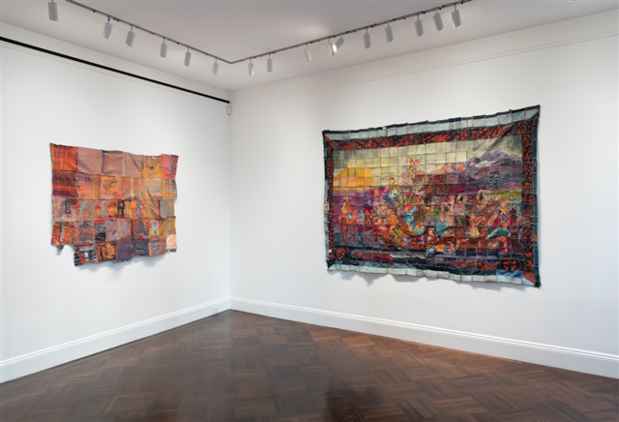Ali Dipp “American Craft”
Franklin Parrasch Gallery

This event has ended.
Franklin Parrasch Gallery presents its first exhibition of work by Ali Dipp (b. 1997, El Paso, TX), American Craft. Born on the binational precipice between the United States and Mexico, Ali Dipp is interested in the evolution of America’s self-representation. Her hometown of El Paso, the former jean capital of the world before NAFTA, sets the backdrop to thematic currents she probes by creating paintings on denim with thread.
Informed by her Lebanese and Syrian familial lineages that migrated to Mexico and the U.S., Dipp fundamentally sees America as a moving picture. From her intrinsic proximity to both the southwestern border and her immigrant heritage, Dipp posits a nation’s ideals are wrought from the labor of daily efforts; aspiration as an American condition has long been central to Dipp’s work. While Dipp originally began making denim stitch paintings to commemorate her family’s immigrant legacy, she has expanded her initial investigations to think about a broadened scope of trajectories across American history.
After viewing the 2015 Whitney Museum of American Art’s exhibition America Is Hard to See, referencing the title of the 1951 Robert Frost poem, Dipp realized that the image that most reminded her of America was the portrait on her grandfather’s green card, as it referred not to a country that we can see but a country conceived by an appetite for all that is not here yet. Dipp postulates that America is not hard to see, but rather is impossible to see, since it is a nation built on visions we can only foresee – a self-evident story of insatiable pursuit. Employing the use of a manual sewing machine, Dipp repurposes denim and thread to speak broadly about what the borderland vividly visualizes: the shape of a nation.
Dipp’s works amass a collection of images across 300 years of nation-making painting, spanning from the Hudson River Valley School through twenty-first century depictions of the West. Together, this set of historical pictures form an aesthetic argument about how American representations reflect a changing nation. Evidence of these visual motifs resound across works of Emanuel Leutze, Frederic Edwin Church, and Albert Bierstadt.
Manually stitching on repurposed Wrangler jeans from El Paso’s Salvation Army store, this exhibition includes three large stitch paintings from an in-progress twelve-part series titled Of Course, as well as a selection of related representational and abstract stitched works. In Dipp’s piece America is Hard to See (For Jasper Johns) (2022), for example, a radiant patchwork of stitched denim spells out the namesake phrase. Much as she describes her aesthetic argument through examination and redefinition of Bierstadt’s and Leutze’s hallmark images in those respective Of Course works, Dipp pays homage to Johns’ America by obliterating the express articulation of text in this piece. As a whole, these denim heirlooms emphasize how reiterating visual scenes enforces American aspiration.
Along with recounting historical representational images, Dipp mends craft and modernism by tying a quilting lexicon into a modernist grid. Buffered by the structural edification of grids, lines, and trajectories, American Craft testifies that even images that present the process of moving into novel terrain pose a promise that is hardly new at all. In bringing about manually-stitched and print-based renditions of historical nation-making images, Dipp’s works interrogate how the ideas of progress themselves progress.
Media
Schedule
from February 23, 2023 to April 14, 2023